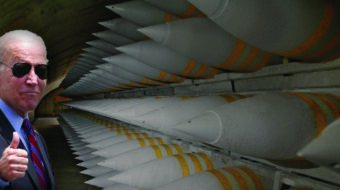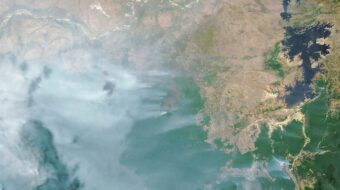On April 14, Venezuelans will elect a new president replacing Hugo Chavez Frias, who died on March 5. Although acting president Nicolas Maduro, of Chavez’ own United Socialist Party of Venezuela (PSUV) has a strong lead in polls over the rightist United Democratic Movement (MUD) of Miranda State Governor Henrique Capriles Radonski, there is still enough time for a dirty tricks effort to try to block Maduro’s victory.
Venezuelan election law requires that if a president dies in office, a new election for the presidency has to be held within 30 days. The government decided to run the elections on April 14. Official campaigning started on Tuesday April 2, and is supposed to stop on April 12.
The worry on the Latin American left is always “what will the United States do?” This worry was awakened again this time when U.S. Assistant Secretary of State for Western Hemisphere Affairs Roberta Jacobson commented that she did not see how Venezuela could have a fair election under existing circumstances.
The far right in the United States had been blasting Chavez in intemperate terms in his lifetime, and has now trained its guns on Maduro. In response to this, Maduro had sharply criticized several U.S. right wingers, including Otto Reich, Roger Noriega and John Negroponte, who were important figures in the Reagan, Bush I and Bush II administrations and who are particularly close to the anti-Castro Cuban scene in South Florida.
Maduro claimed that Capriles was in direct contact with these elements and is receiving funding from them.
In Latin America, it will not be forgotten that these people were involved in the attempted military coup against Chavez in 2002 and the coup in Honduras in 2009.
Seeing himself behind in the polls by about 54 to 37 percent, Capriles is trying out different tactics that would either produce a last minute turn around, or, failing that, would delegitimize the election and induce the United States not to recognize its results.
One tactic is to present himself as a moderate. His supporters in the United States represent him as a “good” socialist on the lines of ex President Lula da Silva and incumbent President Rousseff of Brazil. But the Brazilians have been fully supportive of Chavez and his policies. To drive the point home, Lula made a public statement of support for Maduro. Capriles’ campaign then tried to claim that Lula’s position on Venezuela is different from that of the current president, Ms. Rousseff, but everybody knows that it is not.
A second line of attack for Capriles is to denounce Venezuelan solidarity with Cuba. He has claimed, on the basis of the fact that Chavez received his treatment for cancer there, that the Maduro government is a Cuban puppet. He has promised to cut off subsidized oil supplies to Cuba if he is elected.
Through the PETROCARIBE program, Venezuela has been selling oil on very generous credit terms not only to Cuba but also to 16 other countries, including some of the poorest in the region: Antigua and Barbuda, Bahamas, Belize, Dominica, Dominican Republic, Granada, Guatemala, Guyana, Haiti, Honduras, Jamaica, Nicaragua, St. Kitts and Nieves, St. Lucia, St. Vincent and the Grenadines, and Surinam.
In addition, the Bolivarian Alliance for our America (ALBA) has financial aid programs for poor countries in the region.
Venezuela’s oil generosity has not been confined to left wing governments, but it has infuriated monopoly capital worldwide, because it has allowed these countries to make economic advances without being forced to accept the “Washington Consensus” of neo-liberal policies including free trade rigged to benefit international monopoly capital, austerity and privatization. Critics of the Venezuelan trade and aid policies demand that they end so that countries like Jamaica and Haiti “face up to reality” and accept “tough choices” which always mean more suffering for their poor inhabitants. Another aim of attacking Venezuelan oil diplomacy is to break up the Bolivarian process whereby, under the leadership of Venezuela and Cuba, the whole Latin America region has been moving away from economic and political domination by the United States.
Perhaps forgetting that PETROCARIBE largesse has been made possible because of the high price of petroleum on international markets, which is in part a product of Venezuelan actions within OPEC, Capriles has hinted that he might not eliminate PETROCARIBE entirely, but would definitely kick Cuba out of the arrangement and force other countries to pay more for Venezuelan oil.
Now Capriles has opened another front which is to try to undermine the legitimacy of the CNE, the National Elections Council. This suggests that Capriles and his advisors perceive that they are going to lose on April 14, and want to appeal to the United States to put pressure on Venezuela to annul the results, or even to intervene.
But former U.S. President Jimmy Carter, who has made a second career of analyzing and evaluating election procedures worldwide, has stated that the Venezuelan election procedures are some of the best and cleanest in the world.
The corporate press in the United States, meanwhile, has been darkly hinting that the elections will not be fair, and demanding that international observers oversee them.
This comes from a country whose Supreme Court has ruled that wealthy corporate interests can basically buy elections and candidates, because “corporations are people.”












Comments